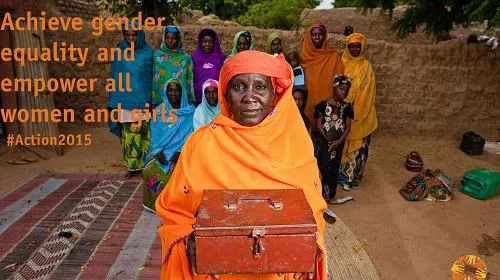Women’s economic empowerment critical for achieving gender equality
NEW YORK (September 25, 2015) — As world leaders convene in New York to discuss the agenda for Sustainable Development Goals (SDGs), CARE International announced today its own ambitious goal to economically empower 30 million more women by 2020.
“We hope CARE’s commitment will help drive the investments and efforts made to accomplish the SDGs. As world leaders lay the groundwork for how we will achieve these global goals, they must recognize that economic empowerment of women and girls will have a transformative impact on progress towards the goals for gender equality, sustainable economic growth, and ensuring no-one is left behind,” said Michelle Nunn CEO of CARE.
CARE plans to achieve this goal through influencing corporations on how they do business and scaling up programs like increasing the 4.5 million people already enrolled in CARE’s Village Savings and Loans Associations. VSLA members deposit their savings in a group lockbox at weekly meetings and earn interest on loans to group members who take out money to start businesses, improve their farms or make other investments in their futures.
“We want to ensure that women have the educational, economic tools and the full rights of participation to be successful in the economic marketplace. We do this by connecting people, challenging and shaping corporate strategies, piloting new initiatives, and standing up for women’s rights,” said Nunn.
This commitment is one of several commitments being made today at a high-level UNGA side event on women’s economic empowerment hosted by CARE International, DFID, UN Women and Vital Voices with speakers Justine Greening, the British International Development Secretary, and Hailemariam Desalegn, the Prime Minister of Ethiopia.
This week the SDGs are being officially adopted at the 70th UNGA Summit for Adoption of the Post-2015 Development Agenda where world leaders are committing to 17 goals to end extreme poverty, fight inequality, injustice and the impact and trends of climate change by 2030.
“CARE welcomes the new SDGs, which include stand-alone goals on both climate change and gender equality, a commitment to reproductive rights and to ending hunger and malnutrition. However, there is a lot of work to do before the SDGs can truly transform the world and that starts this week at the UNGA,” said Kathleen Hunt, UN Representative at CARE International.

